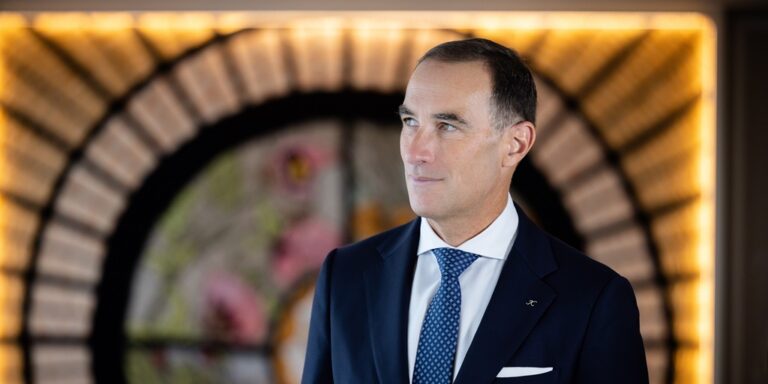Imagery courtesy of Ribas Hotels Group.
Ribas Hotels Group was progressing along nicely as a young and dynamic independent hotel development firm in Ukraine. But how did the company cope when war arrived at its door?
TOPHOTELNEWS talked to Ribas’ founder and CEO, Artur Lupashko, to see what the situation is like on the ground.
Warfare impact
Finding that your country is at war is not a usual challenge for a hotel chain, but that was exactly the situation Ribas found itself in when Russia started to invade Ukraine in February this year.
At that time the company, which organises the development, construction and management of hotel and restaurant complexes in Ukraine and Poland, had 26 properties on its books, with 19 more in the pipeline.
With the onset of the conflict, the company’s existing sites in eastern and southeastern Ukraine had to be closed for safety, leaving 10 in operation. In terms of Ribas’ pipeline, the original 19 was sliced to 12.
Continuing development
But it’s full steam ahead for the dozen though, as Lupashko was keen to emphasise: “The active war is only happening in 20% of Ukraine. The other 80% of our country is still functioning and people are still living their everyday lives – they need hotels and hospitality.
“The war has put a stop to some processes but others are going on, very quickly. Ukranians believe that we are going to win this war and life is not on pause. Of course when the war started everyone was afraid, but it’s been six months now and step by step everything started to come back to life.”
Development and construction is continuing in the western and northern provinces for Ribas, with sites including aparthotel WOL Lviv still on track to complete in Q3 2023, nearby upscale hotel Ribas Lviv preceding that in Q1 2023, the refined Ribas Ternopil scheduled to open in the same quarter, boutique hotel conversion Ribas Frankivsk in Ivano-Frankivsk also opening in the same timeframe, and the 150-key 2be Hotel appearing in capital city Kyiv at the same time too. Other areas Ribas is targeting for development are western Ukranian ski resort Bukovel and other districts within the Carpathian mountains.
Construction management
Furthermore, Ribas Rooms Bila Tserkva opened in June within a six-storey building, encompassing 37 rooms and a modern conference hall with a 100-person capacity. Lupashko underlined that a third of the site’s profits are being sent to charitable military projects. One further hotel is due to open this year with the rest following in 2023.
So how did Ribas manage to keep the development and upcoming constructions on schedule, considering the extensive supply chain disruptions wrought by the war? “I have a great team in my main office helping me to control all processes,” said Lupashko. “Of course there are challenges, but everything is possible. Our hotels are continuing construction and everything is more or less going to plan.”
However, he acknowledged: “There have been obstacles with delivering construction materials, as the majority of them were previously transported through our eastern border or via Russia or Belarus. So we have had to find alternative distribution and logistics, which is a bit complicated.”
Maintaining ambition
Any current hindrances haven’t dimmed Lupashko’s ambition though. In fact it’s only been 9 years since he founded Ribas, having previously been involved in the architecture industry. One of his friends asked him to help with a hotel project in Zatoka, about 60 km along the southern coast from Odessa, and this went so well that Lupashko decided to open his own aparthotel called Hotel Ribas along Odessa’s main thoroughfare in 2014.
Even when the pandemic hit in 2020, this had the opposite than expected effect on Ribas’ fortunes. Lupashko recalled: “Covid was actually good for internal Ukranian tourism because previously many Ukranians went on international holidays. But our country has it all – mountain and coastal resorts, and Ukrainians discovered this when borders were closed during the pandemic. Our business boomed because people were still earning money and wanted to spend it. Only Kyiv was not 100% occupied, but our 2020 income was even higher than 2019. For one moment we thought it would be like this forever.”
This uptick meant that investors were attracted to Ukrainian developments, with Lupashko reporting that Kyiv’s extensive construction in 2021 compared favourably with the rates in other European countries. And with internal tourism now rising again, as the population “gets used to” the conflict situation, plus with charity volunteers needing accommodation and military personnel taking breaks with their families when on rotation, Lupashko detailed: “There are a lot of investors who want to donate money for the future of Ukraine. People are impressed by how we are coping and in the post-war period there will be more business tourists arriving who will want to invest in reconstruction.”
Reconstruction attraction
He has also undertaken his own research about how other conflict zones have bounced back from war, for example in Israel and Sri Lanka, noting: “Their buildings are even more expensive than they were before, so in Ukraine we will be looking at how to rebuild everything to make it better than it was, to create a second Ukrainian renaissance.”
Lupashko is positive about future investments, commenting: “When the war started, investors were reluctant to get involved here so they looked at other European countries but they realised that the situation in Ukraine is now that bad. It is even possible to bring the occupied territories back under our control.
“Plus when we enter the EU the price for buildings will only grow. Our investors’ money will generate more profit here because labour and construction is cheaper than elsewhere in Europe and they decided to stay with us because they understood that nothing is better than investing in Ukraine.”
Lupashko is inspired by major international chain IHG Hotels & Resorts, and he wants Ribas to emulate its rate of opening one or two hotels every day globally. He is looking towards the “retreat hotel” segment, where people can escape from everyday life, as well as adding to Ribas’ Mandra brand of glamping resorts in areas where it is difficult to construct permanent buildings. Currently the firm operates glamping sites in Kaniv, Trubetskoy Chateau in Kherson and Zatoka, and wants to open a new one in the Carpathians and other countryside regions.
Related Articles

Ribas Hotels Group organises the development, construction and management of hotel and restaurant complexes in Ukraine and Poland.
[showlayout id=510774]
Error, group does not exist! Check your syntax! (ID: 3)






